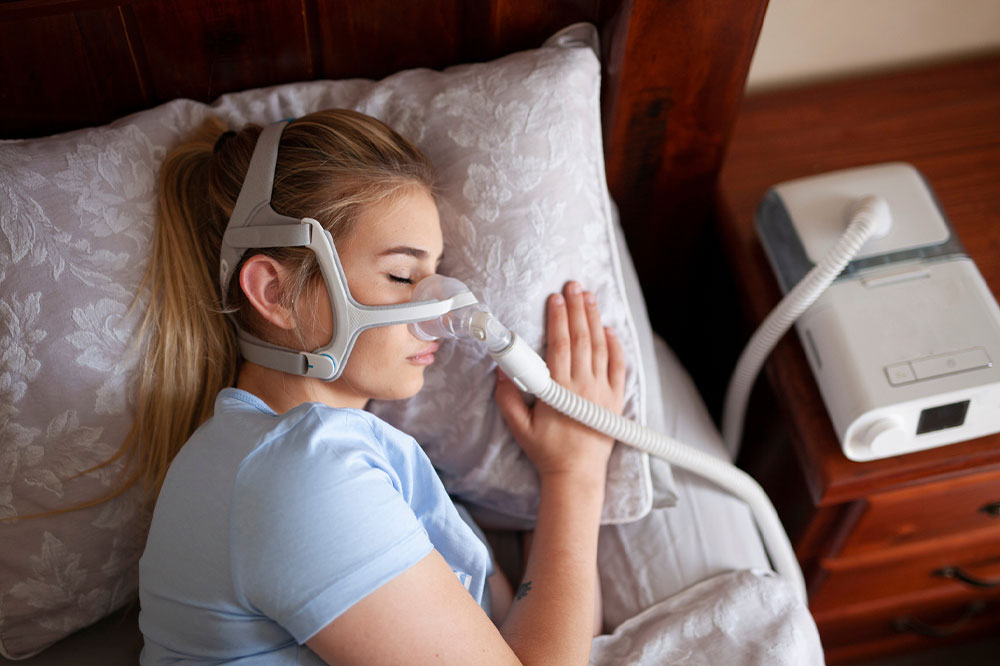CPAP – Best Options and Alternatives to Consider
Continuous positive airway pressure (CPAP) equipment is the primary treatment for breath-impairing disorders like obstructive sleep apnea (OSA). A CPAP machine normally includes a mask worn over the nose or the nose and mouth. The device forces air into the nose and mouth to prevent airway constriction during sleep. The best CPAP machines are known to improve sleep and happiness as well as reduce the risk of cardiovascular disease; here are a few top options:

CPAP Therapy
For moderate to severe OSA, CPAP is considered the most effective treatment. Although using the best CPAP machine is the most effective treatment, even in 2022, clinicians frequently encounter patients who experience difficulty or have discontinued therapy. CPAP therapy consists of sleeping while inhaling air at slightly higher pressures than the surrounding atmosphere. Air pressure is maintained at a constant level during the experiment. This simple concept continues to serve as the core of CPAP therapy. However, technical improvements have made different pressure settings available when CPAP therapy is prescribed. These improvements include increasing the pressure gradually as the treatment begins, decreasing it as the patient exhales, and letting the machine automatically adjust therapeutic pressures.
Alternatives to Using a CPAP Machine
As a treatment for OSA, patients who have been prescribed CPAP have several options. Even though this therapy is effective for treating obstructive sleep apnea, a significant proportion of patients have difficulty with the therapy. Significant proportions of patients unable to continue treatment do so; these patients are commonly referred to as “CPAP Failures.” Non-sleep professionals may perceive CPAP therapy as a stand-alone mode of treatment; nevertheless, there are numerous ways to prescribe the best CPAP to a patient. Each patient is exposed to a unique assortment of options that comprise a separate order set.
Treatment for the Nasal Valve (Provent)
This recent therapy entails putting a valve into each nostril and taping it in place to maintain its position. When you exhale, the valve exerts resistance on the back of your throat, keeping your airway open and enabling normal breathing. Although it is portable and disposable, most health insurance companies do not pay the cost of Provent.
Dental Appliances
Some dental practitioners focus on sleep apnea therapy in addition to those who specialize in orthodontics or dental implants. Oral appliances such as mouthguards can maintain a clear and open airway by keeping the tongue in place and easing the jaw forward.
Sleeping Position
You will encounter a greater number of apnea episodes throughout the night if you sleep on your back with your face turned toward the ceiling, also known as the supine posture. When an individual with OSA sleeps on their back, their tongue and larynx can block their airway.
Medical specialists advocate sleeping on your side rather than your back to lessen the consequences of OSA. Patients who utilize devices that vibrate or vibrate and alert them while they are sleeping on their backs have fewer bouts of apnea. However, sustaining adherence to these devices is difficult, and the technology itself must be enhanced.
BiPAP (Bilevel Positive Airway Pressure)
Such therapy is comparable to CPAP as it utilizes not one but two pressures: an inhalation pressure and a lower exhalation pressure than the inhalation pressure. BiPAP is sometimes utilized as an alternative to CPAP for treating sleep apnea in individuals with other respiratory problems, such as COPD. It was also used for sleep apnea patients who had difficulty tolerating CPAP. Your sleep specialist will be able to help you determine whether BiPAP would be beneficial for you.
ASV
The adapto servo-ventilation (ASV) equipment analyses your respiration and adjusts the airflow accordingly. The variable positive airway pressure machine, often known as a VPAP, will deliver you different quantities of air during your breathing. As does adjusting to the necessary masks, straps, and other attachments, the range of CPAP machines available might be intimidating. Nonetheless, many people ultimately find success with these choices. Discuss with your primary care physician the treatment options that may be most effective for you.
Morphine Milligram Equivalents (MME)
If a patient has moderate to severe OSA and their jawbones are either too short or too long, MME can be used to expand their jawbones (maxillomandibular expansion). This treatment combines orthodontic equipment with surgical operations to lengthen the jawbones. The jawbones’ expansion is performed to enlarge the airway and increase the tongue’s available space.
Factors for Choosing Alternatives to CPAP
People with OSA frequently seek alternatives to even the best CPAP machines. Here are a few factors that make them consider other options:
Cost
The best CPAP price begins at $250 and can exceed $1,000. To use the best CPAP machine acquired via your insurance, you often enroll in a rent-to-own plan with rigorous compliance requirements.
Compliance Requirements
Insurers need the best CPAP users to adhere to a 30-day compliance period, using the device for at least four hours each night on at least 70 percent of nights. Patients may find it difficult to meet these requirements and view doing so as an invasion of their privacy.